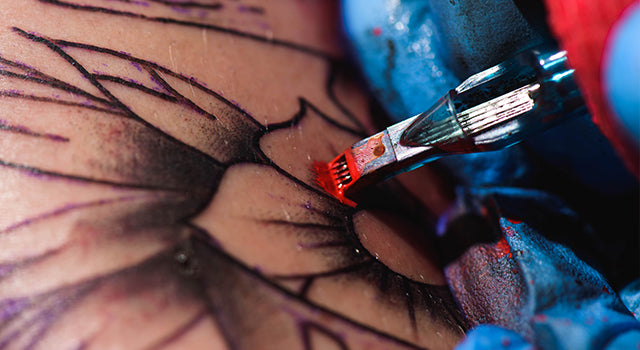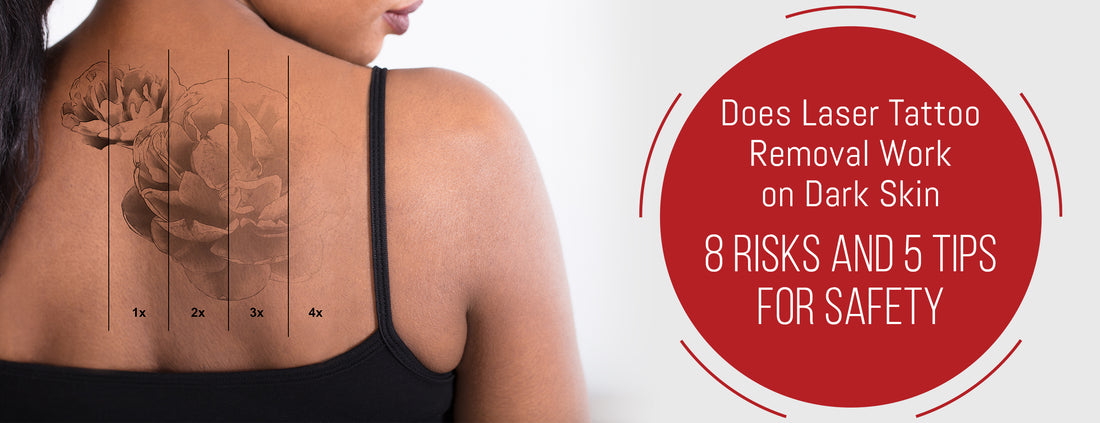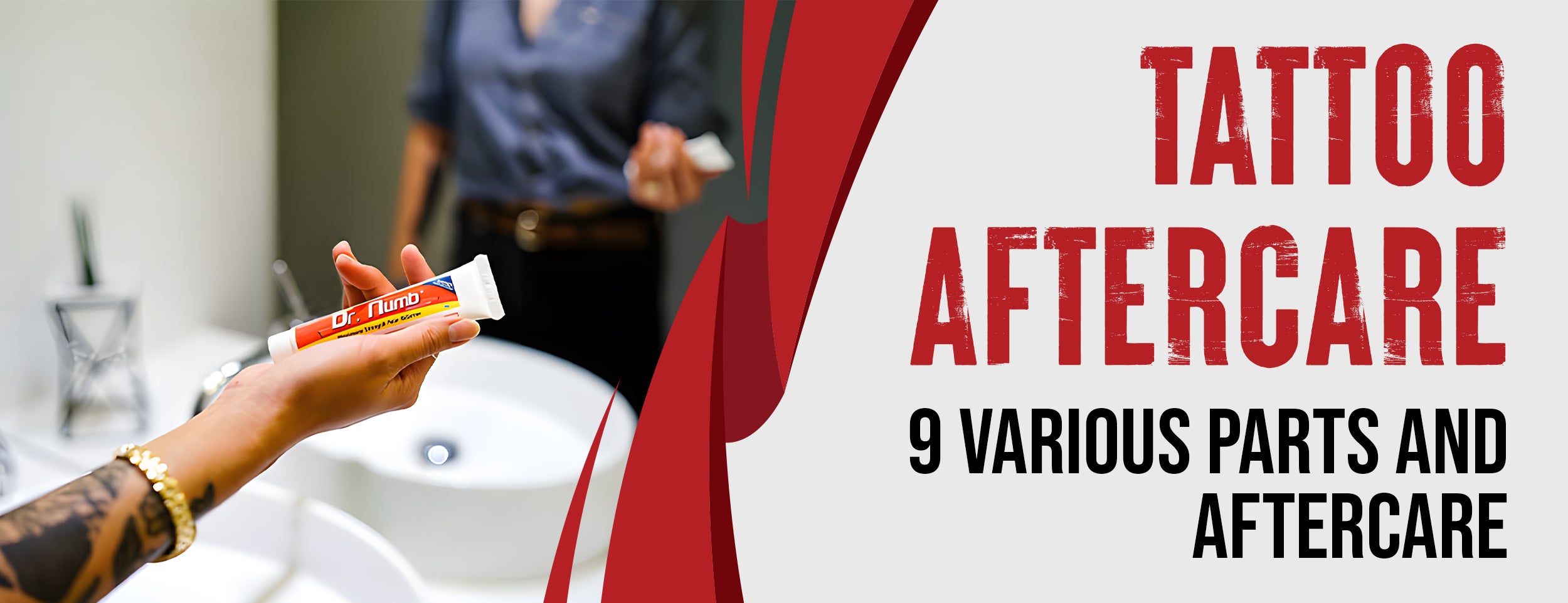People with dark skin may wonder if laser tattoo removal works for them. Some believe that tattoos on dark skin are more complex to remove, while others have heard it will leave more visible scars. But, as extensive research has found, laser tattoo removal on darker-skinned patients works for the vast majority of people. Cases of skin lightening and permanent scarring are rare, too.
Yes. Laser tattoo removal is the safest way to remove tattoos. Laser removal is a noninvasive procedure that does not cause scarification or damage to the surrounding tissue.
In this blog post, we will discuss whether laser tattoo removal works on dark skin, the risks of removing tattoos with lasers on dark skin, precautions during black tattoo removal, and factors that affect it.
Does Laser Tattoo Removal Work on Dark Skin: 8 Risks Associated With It

Laser tattoo removal work on those with dark skin may be at a higher risk of experiencing complications during the procedure. It is essential to understand the potential risks.
Hypopigmentation
Hypopigmentation is a common side effect in dark skin types. This occurs when the laser removes too much pigment from the skin, causing the area to become lighter than the surrounding skin. This type of scarring can be permanent, and there is no guaranteed remedy for restoration.
Hyperpigmentation
Similarly, hyperpigmentation may occur after the removal of tattoos by laser on dark skin. This is caused when too much pigment remains within the skin, causing the treated area to become darker than the surrounding skin. However, this type of scarring is usually only temporary but may last for months.
Keloid Scars
Keloid scars can pose a significant risk for people with dark skin. Keloids are raised scars extending beyond the tattooed area's boundaries and can be painful and itchy. The risk of keloid scarring is higher in people with darker skin tones, as they have more melanin cells. A single treatment can cause keloid scars, and it is essential to consult a dermatologist to understand the likelihood of your skin responding to keloids.

Skin Sensitivity
Dark skin can be more sensitive than other skin types, exacerbating discomfort during laser tattoo removal. Your laser technician may use different lasers to minimize discomfort, but there is still a potential for pain and discomfort as the laser targets the skin.
Infection
Any time the skin is broken or pierced, there is a risk of infection. Even with diligent care and proper procedures taken to remove a tattoo on dark skin, the risk of infection is present. Contact your doctor immediately if you notice any redness, swelling, or discharge from your treated skin.
Allergic Reactions
Allergic reactions from laser tattoo removal are infrequent but can occur in anyone. This occurs when the skin responds negatively to the materials used during your laser tattoo removal process. It's essential to consult with your technician before the procedure begins if you have allergies or previous reactions to creams or topical ointments.
Skin Darkening
Another potential consequence of removing dark skin tattoos with lasers is skin darkening. This occurs when the laser damages the melanin structure of the skin, making the treated area darker than the surrounding area. This type of hyperpigmentation can be temporary, but it can also be long-lasting.
Laser Burns
Must be noted that laser tattoo removal can cause burns. This is true for individuals with darker skin tones because they have more pigmentation, which can absorb more laser energy. Choosing a reputable and experienced practitioner and following the after-care instructions is essential to avoid laser burns.
5 Factors Affecting Laser Tattoo Removal on Dark Skin

Laser tattoo removal is a popular method that has been successful for many individuals. For people with dark skin, it can be a bit more challenging because of the pigmentation. It is possible to remove dark skin tattoos with lasers, but a few factors can affect its effectiveness.
Skin Tone
The darker the skin tone, the more melanin it has, making it more challenging for the laser to differentiate between the ink color and the skin. Therefore, removing tattoos on dark skin requires a specific laser to penetrate deeper into the skin without causing damage.
Type of Tattoo Ink
Some tattoo inks are easier to remove than others. Black, red, and dark blue are relatively more straightforward to remove. However, green, yellow, and white are more challenging to eliminate. The type of tattoo ink used on dark skin can thus affect the laser tattoo removal process.
Tattoo Location
Tattoos on areas with thicker skin, such as the arms, are easier to remove than on thinner skin parts, such as the fingers or face. For darker skin, the location of the tattoo can also affect the laser's effectiveness.
Laser Type and Settings
Different lasers are more effective on specific ink colors, skin types, and skin conditions. For dark skin, a Nd: YAG laser with a longer pulse duration is ideal as it can penetrate deeper into the skin's thickness without causing damage. Proper settings on the laser are also crucial to achieve a successful treatment.
Experience and Expertise as a Laser Technician
The skill level and experience of the laser technician can significantly influence the result. Therefore, choosing an experienced laser technician who can operate the laser effectively and use the settings for your skin type is vital.

5 Safety Precautions Tips For Removing Tattoos on Dark Skin
If you have dark skin and are considering laser tattoo removal, remember some essential safety precautions. Laser tattoo removal can be effective on dark skin but can also be risky if not done correctly. Here are some tips for safe laser tattoo removal on dark skin:
Consult with a Professional Dermatologist
Consult with a professional dermatologist to determine if laser tattoo removal is suitable for your skin type and tone. They will evaluate your skin condition and provide an appropriate treatment plan that minimizes skin damage and hyperpigmentation.
Remove Dark Skin Tattoos With A Laser Expert
Choose a laser specialist with expertise in removing tattoos from dark skin with lasers. They should have sufficient knowledge of laser settings suitable for dark skin tones and experience managing potential complications.
Test the Laser Settings
The laser specialist will test the settings on a small tattoo area before starting the procedure. This will help determine the laser settings to use for safe and effective tattoo removal on your dark skin.
Protect Your Skin from the Sun

Make sure your skin is protected from the sun before and after laser tattoo removal. It's essential to avoid being in the sun for extended periods and to use a broad-spectrum sunscreen with an SPF of at least 30 on the treated skin.
Follow the After-Care Instructions
Dark skin that has been tattooed requires after-care to prevent hyperpigmentation. Adhere to the laser specialist's after-care instructions to ensure the best results and reduce the risk of skin damage.
Conclusion
Laser tattoo removal is a viable option to remove tattoos from dark skin. However, weighing the risks and benefits and discussing them with a qualified professional is essential.
By doing this, you can make the right decision for your skin type and ensure that the removal process is. So, if you're considering laser tattoo removal, do your research and consult a reputable practitioner who can help guide you through the process.


















![Antibiotics and Tattoos: 3 Risks and 3 Effects [with 4 Precautions]](http://drnumb.com/cdn/shop/articles/Can_You_Get_Tattooed_On_Antibiotics__3_Risks_and_3_Effects_4_Precautions.jpg?v=1714128292)

